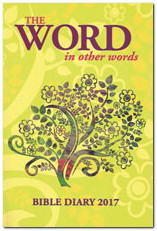THE WORD
FIRST READING:
The people who walked in darkness have seen a great light; Upon those who lived in a land of gloom a light has shone.
You have brought them abundant joy and great rejoicing;
They rejoice before you as people rejoice at harvest, as they exult when dividing the spoils.
For the yoke that burdened them, the pole on their shoulder,
The rod of their taskmaster, you have smashed, as on the day of Midian.
For every boot that tramped in battle, every cloak rolled in blood, will be burned as fuel for fire.
For a child is born to us, a son is given to us; upon his shoulder dominion rests.
They name him Wonder-Counselor, God-Hero, Father-Forever, Prince of Peace. His dominion is vast and forever peaceful,
Upon David's throne, and over his kingdom, which he confirms and sustains By judgment and justice, both now and forever. The zeal of the Lord of hosts will do this!
SECOND READING: Eph 1,3-6.15-18
Brothers and sisters: Blessed be the God and Father of our Lord Jesus Christ, who has blessed us in Christ with every spiritual blessing in the heavens, as he chose us in him, before the foundation of the world, to be holy and without blemish before him. In love he destined us for adoption to himself through Jesus Christ, in accord with the favor of his will, for the praise of the glory of his grace that he granted us in the beloved.
Therefore, I, too, hearing of your faith in the Lord Jesus and of your love for all the holy ones, do not cease giving thanks for you, remembering you in my prayers, that the God of our Lord Jesus Christ, the Father of glory, may give you a spirit of wisdom and revelation resulting in knowledge of him. May the eyes of [your] hearts be enlightened, that you may know what is the hope that belongs to his call, what are the riches of glory in his inheritance among the holy ones.
GOSPEL: Mt 18,1-5.10
At that time the disciples approached Jesus and said, "Who is the greatest in the kingdom of heaven?" He called a child over, placed it in their midst, and said, "Amen' I say to you, unless you turn and become like children, you will not enter the kingdom of heaven. Whoever humbles himself like this child is the greatest in the kingdom Of heaven. And whoever receives one child such as this in my name receives me. See that you do not despise one of these little ones, for I say to you that their angels in heaven always look upon the face of my heavenly Father."
IN OTHER WORDS
The child that Matthew brings to our attention in the gospel could be any child. The child of Isaiah in the First Reading is now some 30 years old or so, Jesus of Nazareth and he is now the Great Teacher, the center of our attention. He picks up a particular child, putting him in the midst of his disciples as he replies to the disciples' question: "Who is the greatest in the kingdom of heaven?" Jesus said, "Amen, I say to you, unless you turn and become like children, you will not enter the kingdom of heaven. Whoever humbles himself like this child is the greatest in the kingdom of heaven...
So the answer to the query is: the humble one, the humblest one, is the greatest in the kingdom of heaven. For one to enter the kingdom one must become like a little child. And for one to be the greatest in the kingdom, one must be the humblest.
Who would not want to win heaven? The disciples of Jesus themselves did not only have the ambition to get there but even to be great there. In other words, Jesus' admonition is as clear as it is simple: Be childlike, be lowly, be little, be simple, be humble!
Therese of the Child Jesus did very wisely when she took this particular word of Jesus to be the very kernel of her spirituality, her "Little Way"—"the way of spiritual childhood, the way of trust and self-surrender to God." She was a little child trusting the heavenly Father fully— imagining herself in the arms of Him, safe and secure, feeling infinitely loved, with nothing to fear or to be anxious about. Not even about her sins she trusted in the all-forgiving Father.
"Unless we become little, we cannot please God," according to St. Arnold Janssen(1837-1909), the father and founder of the Arnoldus family: SVD, SSpS & SSpSAP (Pink Sisters). Today, 15 January, is his feast day. But celebrating it has to give way to the much bigger feastday celebration of the Little Child, the Santo Nino.
As a Little Child —that's how the Savior of the world, the Son of God himself, started his journey of saving humankind. And he kept to being little all the days of his life on earth, such that he could throw his great challenge at normally proud, arrogant earthlings: "Learn of me for I am gentle and humble of heart." Finally, like a helpless, little child forsaken by his Father, he could tell his Father just before he breathed his last on the cross: "Mission accomplished. Father, into your hands I commend my spirit." And was the Father pleased, indeed. . . ! (cf, Phil.2,6-11) Miserable earthlings that we are, when, oh when, do we learn to be Christ-like, at last?
- Fr. Dong Alpuerto, SVD (USC-Talamban, Cebu City)
The Word in other words 2017
An annual project of Logos Publications, The WORD in Other Words Bible Diary contains daily scripture readings and reflections written by priest, brothers, and sisters of the three congregations founded by St. Arnold Janssen (the SVD, SSpS, and SSpSAP). It hopes to serve as a daily companion to readers who continually seek the correlation of the Word of God and human experience.


